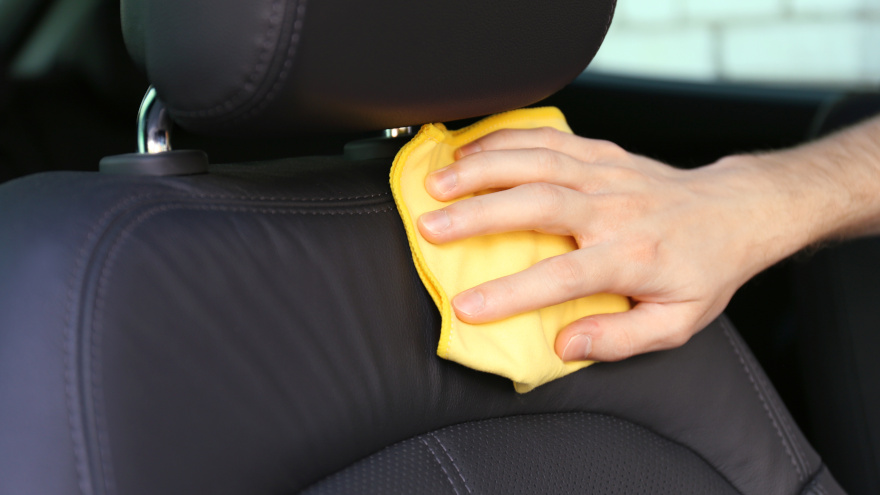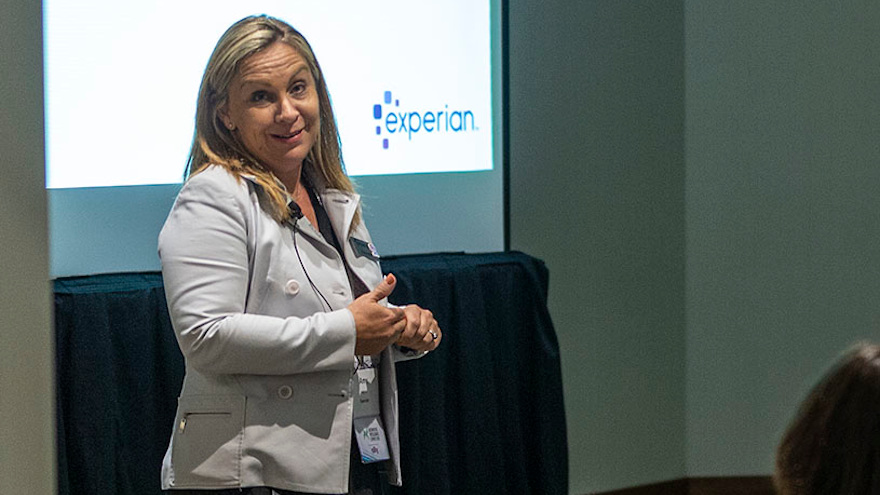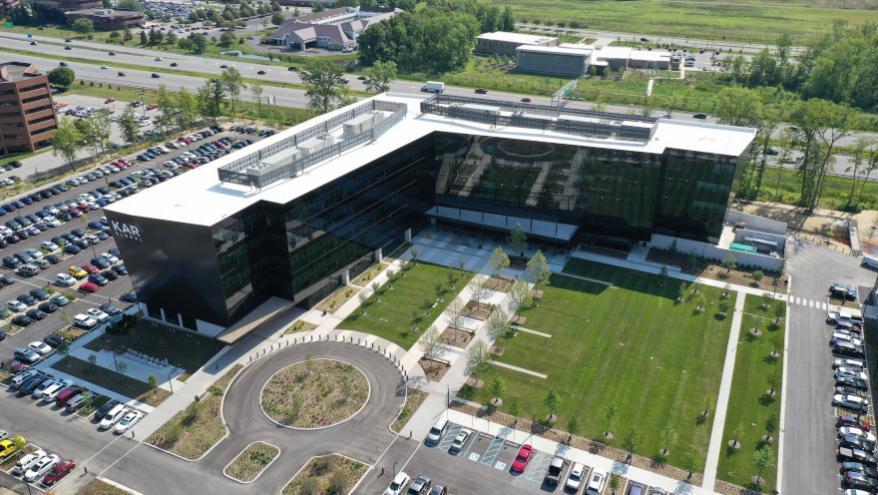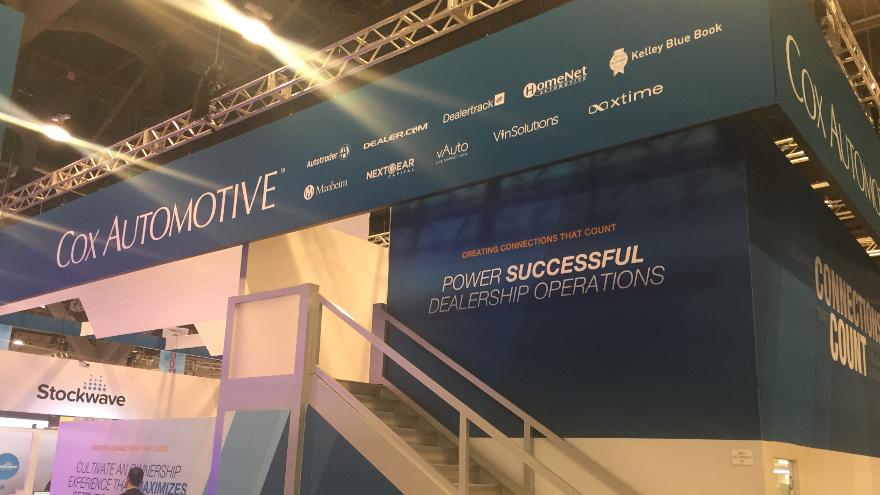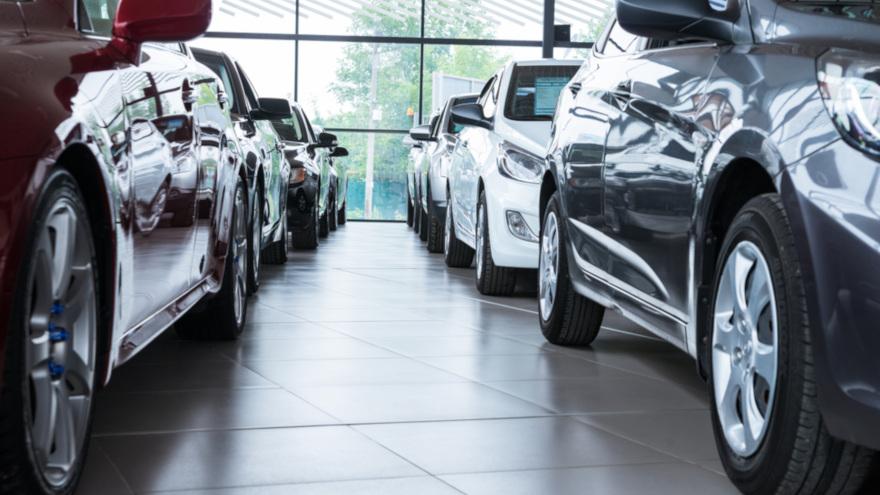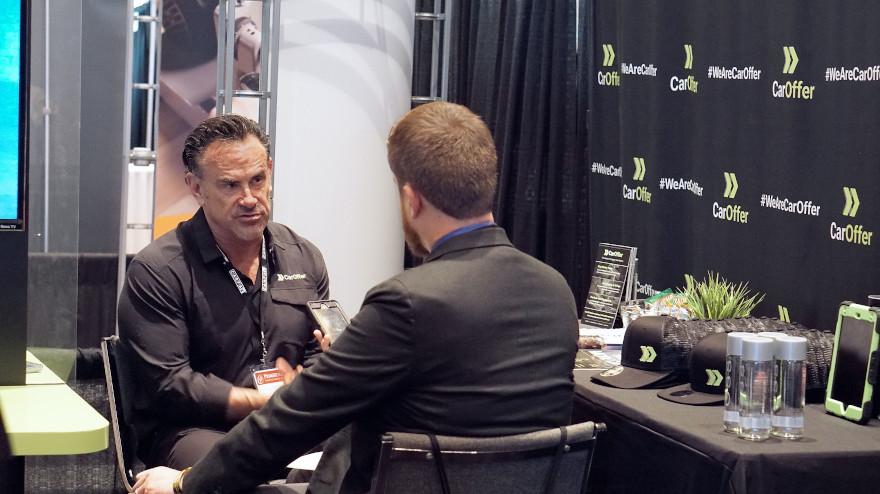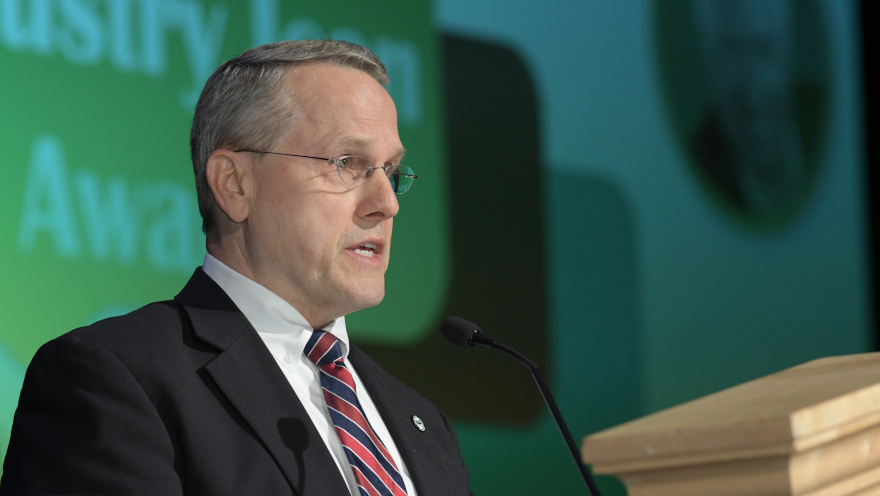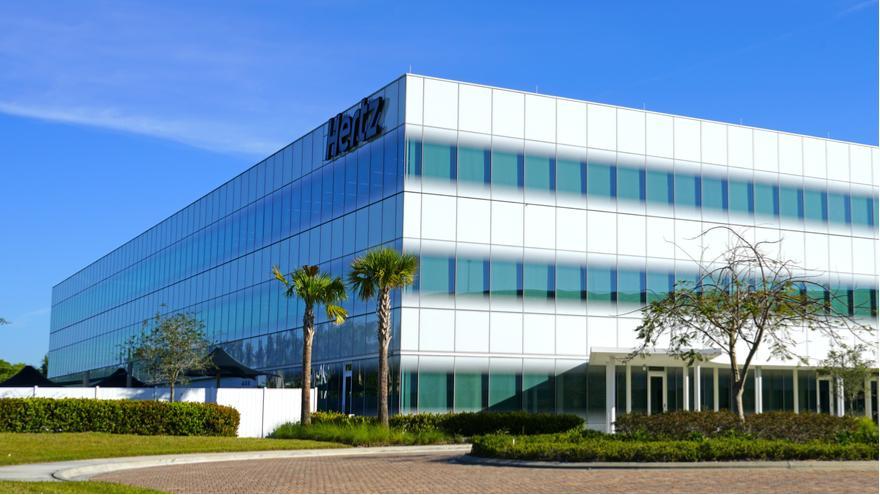Mobile vehicle care and fleet services company RideKleen introduced its new Surface Disinfection and Air Cleanse services back in April. With the service, RideKleen said it can treat vehicles with an EPA-approved, hospital-grade disinfectant called DetraPel.
That product is designed to kill 99.9% of bacteria and viruses, including Coronavirus.
Since then, the company has upgraded and enhanced the service, incorporating a new disinfection solution.
“We’re really working toward redefining cleaning,” RideKleen president Pratik Patel said in an interview with Auto Remarketing.
The company said on Monday that it was introducing a vehicle hygiene product solution and service called PureProtect by RideKleen.
That service provides vehicle disinfection and air cleanse protection for fleet owners and operators, riders and drivers.
Patel explained that with PureProtect, RideKleen has upgraded its service so that it cleans soft surfaces in addition to hard. A second improvement is that the product provides a 30-day residual benefit.
“And what I mean by that is that in addition to a kill at the immediate contact of the product, there’s also a residual for protection that it gives for inhibiting bacterial growth for up to 30 days,” Patel said.
He continued, “So there’s almost like an added protection that you're getting even after the service.”
He expanded on how the company is redefining cleaning, noting that historically, people have thought of cleaning in terms of visually clean.
“When you look at a car, hey, looks clean, it must be clean,” Patel said.
He continued, “I think with the COVID outbreak and going forward, what the norm is going to look like, it looks clean, but is it really clean, when it comes to disinfection of the vehicle.”
Regarding PureProtect by RideKleen, the new offering that provides vehicle disinfection and air cleanse protection for fleet owners and operators, riders and drivers is available in all RideKleen markets, including Atlanta, Los Angeles, New York, Philadelphia, Phoenix and San Francisco.
RideKleen says it is empowering its customers with do-it-yourself offerings, including “high-volume enterprise solutions” and individual vehicle kits featuring the products, supplies and training so that companies can more safely disinfect and protect vehicles on their own.
More on PureProtect
PureProtect by RideKleen kits feature an “eco-conscious” cleaner from Caring Brands. The cleaner sanitizes, disinfects and protects the entire vehicle, including the interior cabin, A/C ventilation system, trunk and cargo areas.
The U.S.-made EPA-registered and approved antimicrobial cleaner is food-safe and approved for use on hard and soft surfaces, killing up to 99.9% of germs, bacteria, mold, mildew and emerging viruses. Rather than offering temporary protection, PureProtect by RideKleen provides an ongoing residual effect to slow the growth of odor-causing germs, mold and mildew for up to 30 days post-treatment.
Cox Automotive Mobility’s Pivet facilities in Atlanta and Phoenix, as well as Manheim locations nationwide, are using PureProtect by RideKleen kits and service.
Complimentary sanitization services are also being performed for first responders in Philadelphia and Atlanta, including the Upper Southampton Township Police Department in Philadelphia and DeKalb County Police Department in Atlanta. RideKleen will also roll out PureProtect by RideKleen services in partnership with dealers using Clutch Technologies’ Retail Delivery & Service Pickup and Delivery software, which the company says can result in safe, touchless retail and service experiences.
With PureProtect by RideKleen’s single vehicle kits and high-volume product options, the company says providers can offer peace of mind to drivers and riders. That helps dealers by providing assurance for the 83% of consumers who say disinfecting vehicle surfaces after a service appointment or test drive is extremely or very important, according to the 2020 Cox Automotive COVID-19 Consumer & Impact Study.
RideKleen sourced another recent Cox Automotive survey showing that dealers are more likely to use the disinfection products if they are offered as a do-it-yourself product rather than full-service.
With PureProtect by RideKleen, the company says providers can sanitize and disinfect vehicles in locations most convenient for their customers, such as a home driveway or office park.
That helps RideKleen customers further differentiate their offering with vehicle disinfection at the final point of delivery.
The company provided more information on the two services, noting that PureProtect by RideKleen Single Vehicle Kits sanitize and disinfect a vehicle in 10 minutes or less. The do-it-yourself kit includes a cleaner and disinfectant bottle, microfiber cloth, a pair of disposable latex-free gloves, face mask, disposable hand sanitizer wipe, rearview mirror hangtag to signal completed disinfection, and instructional card with access to additional training materials.
The second service, PureProtect by RideKleen Enterprise Product Solutions, involves customized solutions for high-volume operations. It includes drop shipment of one-gallon, five-gallon and 55-gallon containers along with atomizer or fogger applicators directly to customers. RideKleen said the offering is ideal for servicing small and large vehicle fleets, with training support from the RideKleen team.
RideKleen has created a digital marketing toolbox to help dealers and other providers promote their PureProtect by RideKleen services and boost consumer confidence. The toolbox includes educational brochures and collateral, exterior signage, and website creative elements.
Looking clean is not enough
Patel told Auto Remarketing that he has seen research showing people spend an average of one to one and a half hours per day in their vehicles.
What does the vehicle look like? The typical vehicle needs to be cleaned. Patel said the average steering wheel in a vehicle is about nine times dirtier than a public restroom.
“And what’s the first thing you touch when you get in the car? The steering wheel, typically, right?” Patel said.
He continued, “The vehicle’s interior has probably about 40% more germs than the average toilet seat. So just looking clean, is that enough? That’s kind of why we’re looking at this program as not only a response to the COVID outbreak and how we can help, but it’s also about redefining cleaning going forward.”
Experian senior director of dealer intelligence Amy Hughes joined Nick Zulovich for this episode of the Auto Remarketing Podcast to share trends the company has found through its consumer survey data that’s updated daily.
Hughes touched on topics such as when potential buyers might make a purchase, how vehicle history reports are playing a role and what current owners are looking for in the service drive.
To listen to this episode, click on the link available below, or visit the Auto Remarketing Podcast page.
Download and subscribe to the Auto Remarketing Podcast on iTunes or on Google Play.
NOTE: UPDATED with additional OEM CPO incentive info.
The certified pre-owned vehicle segment has an array of consumer- and business-facing benefits, and the latter would certainly include automakers and their captive finance arms.
CPO can be a lever for captives to boost dealer demand for off-lease volume, through such perks as APR programs and extended warranties, says Jonathan Banks of J.D. Power Valuation Services.
And amid COVID-19, it appears many automakers are taking this to heart, sweetening the pot for CPO sales, a move that can help buoy some of the downward used-car price movement and drive consumer demand for certified.
“We wanted to look at, ‘are manufacturers changing their programs to help mitigate some of the declines in used-vehicle prices and stimulate demand for these very highly desirable vehicles?’” Banks said Wednesday during the weekly webinar on the J.D. Power Auto Industry Impact Report.
“What we found, in general, is that we have seen some programs come into play,” he said.
In presentation slides, J.D. Power compares the pre-virus incentives from February to March/April incentives of 23 CPO programs (citing data from its Autodata Solutions division).
In February, 13 of the 23 had what “no special offers.”
For March/April, only four of the 23 had no special offers.
“Numerous OEMs have enhanced APR offers to help stimulate demand for used certified pre-owned units. Some, particularly premium OEMs, have also added 90-day payment deferrals to further support demand,” J.D. Power said in its slides.
Referring to the chart, Banks noted: “You can see how these quite a few changes to some of the programs … the captive finance companies are adding incentives for consumers to buy certified pre-owned.
“And what that does is, it helps the dealers by giving the dealers a value proposition to the consumer,” Banks said. “So, ultimately what the captive finance companies want is for the dealers to buy more of their vehicles upstream.”
The presentation showed how prices in direct-to-dealer wholesale sales — which J.D. Power describes as “usually facilitated by online tools that occur in advance or outside of a physical auction sale” — have been more stable than prices in physical auction sales during the pandemic.
The price index (where March 1 = 100) for direct-to-dealer wholesale prices has been in the 94 range for the last three weeks. The wholesale auction index, meanwhile, dropped from 101.8 the week of March 15 to 84.8 by the week of April 19, before rising in each of the last two weeks.
“And if we go back and think about how the upstream prices are holding much strong than the physical auctions, this makes a lot of sense,” Banks said of captives wanting dealers to use upstream channels. “So, we’re seeing the captive finance companies use tools to help keep used-car prices firm for those late-model used (units) and also providing good value proposition for the dealers.
“Now granted, this is really untapped in our opinion, where you can increase the program’s desirability and you can market these vehicles to create a real pull-based strategy for used vehicles, instead of just discounting,” he said. “So, this is a great tool for the captives to use that you can see is starting to be more utilized than it was pre-COVID.”
Incentives from CPO programs
On Monday, Auto Remarketing reached out to a wide range of automaker CPO programs and asked them to share any incentives/deals they were offering on certified vehicles or any other CPO-related programs they were running with dealers.
Below is a roundup, based on what those CPO managers shared:
Of the incentives that include CPO, Porsche Financial Services has a “90 Days to First Payment” program for CPO retail contracts dated April 4-June 30, where allowed by state regulation, the automaker said. This is not allowed in Pennsylvania or Maine, per state regulations.
Additionally, there is 1.95% APR financing for up to 60 months is available on select CPO contracts from April 16-June 1. This deal is “compatible” with the above deal. But only Level 1 (Tier 1 credit) qualifying customers can access it.
At America Honda Motor Co., the Honda certified program is offering Dream Deal APR Sales Event through June 1. That deal is on the Accord, Civic and CR-V models. The company said regional offer and details are available online. Acura is conducting is Certified Pre-Owned APR Sales Event through June 1, offering 0.99% APR for up to 36 months on the RDX and TLX models.
“We are monitoring the market closely and actively providing support to help our dealers navigate through these challenging times. We are offering APR support for both our Honda and Acura brands. Honda is featuring APR support on our core models of Accord, Civic and CR-V and Acura featuring RDX and TLX,” Dan Rodriguez, manager of auto remarketing and certified pre-owned for American Honda, said via email.
Volkswagen is offering 0% financing for up to 60 months on certified through the end of next month.
Michael Ashton, who is VW’s senior manager of national CPO/used operations, said this incentive began in mid-April and led to a significant uptick in CPO “within days.”
“I don’t think I ever remember seeing that aggressive of a rate for 60 months from any OEM,” Ashton said via email. “We are proud of the 0% at Volkswagen because it is helping our customers and driving traffic into our dealerships during these challenging times.”
Cadillac is offering 2.9% financing for 60 months and is also allowing payments to be deferred for 90 days for customers.
Nissan is offering 1.99% special APR financing for 60 months or $450 captive cash on CPO purchases on its core models of Versa, Versa Note, Sentra, Altima, Rogue and Rogue Sport. Any CPO vehicle financed via Nissan Motor Acceptance Corp. will receive a year of complimentary maintenance.
Nissan is also offering an option to have payments delayed 90 days on all certified purchases financing with a NMAC special APR.
Over at Fiat Chrysler Automobiles, head of CPOV Eric Swanson said the program has put a big emphasis on video conference calls and digital retailing, and finished with a 13% share in April, its best ever.
Jaguar Land Rover is offering as low as 0.9% financing on select certified pre-owned that are financed via Jaguar or Land Rover Financial Group. Specific breakdowns for those deals, which last through June 1, are available from the Jaguar and Land Rover websites.
Mazda is offering approved customers 1.9% financing for 60 months on all CPO model as well as a payment deferment for 90 days after the contract date.
Toyota is providing 2.9% financing through the end of June on certified Camry, Corolla, RAV4 and Tacoma.
Ron Cooney, who is TCUV sales operations manager at Toyota Motor North America, said via email that even though the incentives technically have an end date next month, he plans to renew special financing deals each month on several vehicles for the rest of the year.
Toyota also began offering a 90-day deferment on the first CPO payment on purchases in April. That deal continues this month.
“On the sales side, we have seen great week over week and month over month growth since this all started. This weekend’s business was a 150% improvement over the first weekend in April,” Cooney said. “A couple of our regions saw weekend TCUV sales increases over the same weekend last year. That’s amazing! Each day’s national sales exceeded the daily target for the last several days. So, things are really trending in the right direction.
“Online search and lead data is showing great signs of improvement too. Some KPIs show consumer engagement and interaction nearing pre epidemic levels,” he said.
Chance for OEMs to get more dealers involved
In an Auto Remarketing story from Jim Leman and in a subsequent Auto Remarketing Podcast episode — both of which were published in April — Lotpop founder Jasen Rice said CPO could emerge as the “winner” from COVID-19. But for that to happen, he champions automakers backing up certified programs with incentives like the ones described above.
He also advocates potentially waiving CPO fees for dealers and driving more attention to the segment.
With large quantities of late-model off-rental and off-lease cars hitting the market, Rice said in the podcast, “The OEMs are going to take a beating on these cars as much as the fleet companies, rental companies (and) dealerships (are) … And then those years — the 2020s, ‘19s, ‘18s — when those take a beating, it’s going to trickle down to the rest of the cars out there.”
He encourages automakers to put incentives on CPO vehicles “at a great level, like they do on new” and push some attention towards the segment.
Rice said that “consumers are going to be very hesitant to buy a new car and spend a lot of dollars, so if they can get a nice used CPO under warranty that whole time, it’s stabilizes the market a little bit, instead of it dropping … 15-20%, it might drop 10% or less.
“And then, it depends on the retail push that comes in, hopefully, but then it also reserves residual values for the new cars for dealers to then be able to maybe lease new cars. Because if these late models just fall to the bottom and lose thousands of dollars, the residual values aren’t going to be very great, either.”
And that leads to “a trickle-down effect,” he said.
“So, if they do back (CPO) up, I think it becomes the winner, because more people are going to probably tend to buy used over new, especially a warranty-backed (car with) good incentives,” Rice said. “Dealers will back it if they waive the fees and start gobbling up these cars and get a better demand on them.”
Dealers have bought in to CPO, for the most part. Some, of course, have not gravitated to CPO, because of fees and a perceived lack of gross profit potential.
“This is the chance for OEMs to get the other dealers, the doubters, back in line, to be excited about CPO,” Rice said. “I think it’d be a win-win for everybody.”
So far, it appears they are stepping up.
EDITOR'S NOTE: Updated to include the re-opening of ADESA Assurance on Monday.
Among other measures to “help protect the business and its liquidity” amid the negative impact of COVID-19 on its operations, KAR Global said in its earnings release Thursday it furloughed roughly 11,000 employees last month.
This news comes on the same day it was revealed that its primary competitor, Cox Automotive, will furlough over 12,500 employees internationally later this month, roughly 10,000 of which are in the U.S. — and about 87% of the U.S. furloughs are Manheim employees, Cox said in a statement provided to Auto Remarketing.
More details on that and other expense-reducing measures Cox is taking are available here.
These moves reflect what is happening in both the auto industry and the economy at large.
The U.S. Department of Labor reported on Thursday morning that another 3,169,000 workers made their initial claim for unemployment benefits during the week ending May 2, lifting the seven-week total above 33 million
Additional steps from KAR
KAR has taken several other measures to reduce compensation expense, including the company’s chief executive officer (Jim Hallett), chief financial officer (Eric Loughmiller) and president (Peter Kelly) voluntarily foregoing their base salaries from April 5 through at least June 27.
The rest of KAR’s executive officers have voluntarily agreed to reduce salaries by 50% for same time frame.
KAR has also temporarily reduced base salaries in “many levels of the organization”, and its board of directors has voluntarily forgone its cash compensation for the second quarter.
KAR has also prohibited any business travel, delayed or canceled capital projects at its physical auctions and temporarily suspended its quarterly dividend.
It has also worked to defer rent payments with “certain landlords.” Additionally, KAR notes that, “Non-essential services provided by third parties at the company's locations have generally been suspended.”
KAR also temporarily suspended the ADESA Assurance program, but opened it back up on Monday.
The AFC business unit has trimmed “the unused portion of certain floorplan lines with its customers.”
Cox Automotive will furlough over 12,500 employees internationally later this month, roughly 10,000 of which are in the U.S., the company said in a statement provided to Auto Remarketing.
Cox Automotive is starting the furloughs May 17. They will last for up to 16 weeks. The company emphasized that, “those furloughed will remain employees of Cox Automotive throughout the furlough period and will retain their existing healthcare benefits, paid entirely by Cox Automotive.”
Close to 87% of those furloughed in the US are with Manheim, and most of those people are part-time drivers for the auctions or employees providing sale-day assistance at auctions.
The Manheim cuts are “due to the sharp declines in wholesale transactions and a necessary move to an all-digital format at all Manheim auctions in the U.S.”
Included in the total sum are approximately 4,600 full-time employees throughout the Cox Automotive business lines, who are being furloughed “because they are unable to substantially perform their duties from home and/or whose current workload has been significantly reduced,” the company said in a statement.
“A furlough is different than a layoff, and our hope is that we will be able to have as many of these people back as soon as conditions allow. We know, though, it is impossible to predict the course or duration of this pandemic and whether any of the furloughs will become permanent,” Cox Automotive president and chief executive officer Sandy Schwartz said in an internal email obtained by Auto Remarketing.
“I could say a lot of things about this being the best-case scenario, but nothing will change that furloughs and pay cuts are painful and represent real sacrifices for many families,” he said. “We don’t take lightly the broad impact these actions will have on everyone; the toll from COVID-19 is already so high, and this adds more uncertainty. If there were another way, I promise we would have done it.”
The company is making several other cost-reductions, as well.
Schwartz and Alex Taylor, CEO of parent company Cox Enterprises, are foregoing their full base salaries during the pandemic.
There will be 25% pay reductions for executive leadership team members at Cox Automotive and 15% pay reductions for senior leaders who are vice presidents or higher.
The company is also reducing work hours for some hourly employees.
It has “significantly cut” its marketing budget, limiting hiring to positions supporting business demand, stopped using the majority of its contractors and consultants and postponed/cancelled several events and sponsorships.
While on the national stage, there have been discussions around the economy re-opening, Cox Automotive’s clients and its own business are still seeing “dramatic” financial impacts from the pandemic, Schwartz said in the email, saying he doesn’t expect them to “ease” any time soon.
“As I wrote a few weeks ago, we’ve done everything we can to withstand this temporary shock to our operations. Our quick cost containment actions and the generosity of our owners have forestalled the need for payroll cuts — until now,” Schwartz said.
“The automotive industry is beginning to show some signs of life, but we’re expecting a slow recovery and a long road back for our revenue. That’s why we now have to finally take some of the more painful steps other companies began weeks ago in order to cut a big portion of our payroll for the duration of the COVID-19 related economic crisis,” he said.
“We’re going to do this in a few different ways that allow us to keep providing essential services to our clients and ensure we’re able to maintain our leadership position in the industry when things get back to ‘normal.’”
Used-car sales hit another bump mid-week, but started to rebound as the weekend approached, according to a Cox Automotive analysis of used-vehicle sales last week, among other metrics.
“We estimate that used was down 50% year-over-year last week, as used sales lost some ground at month-end, presumably in competition with new, but then saw an improving trend again through the weekend,” chief economist Jonathan Smoke said in his weekly video report.
Specifically, a chart in Cox Automotive’s data set of daily used retail percent change year-over-year over the same day of the week shows a growing decline starting April 27, but that appears to have reversed course once May began.
As for full-month sales, TrueCar’s ALG business unit, in late April, was forecasting a 71% year-over-year decline in used-car sales in April, projecting a monthly tally of 1,086,494 used sales. That would also represent a 60% month-over-month decline.
In a webinar on Wednesday, J.D. Power shared data that indicated there were 1,345,784 used-vehicle retail sales at franchised dealers from March 2 through Sunday.
That’s down 35% from what was forecasted before the virus (2,058,553), according to the data. Or put differently, 712,770 lost sales.
Consumers spent $30 billion on used-vehicle sales at franchised dealerships during this period, according to J.D. Power, compared to the $44.9 billion that was forecasted.
Franchised dealers pulled in $2.8 billion in used-car profits during the two-month span, which is down from the forecasted $4.5 billion, the data shows.
CarOffer founder and chief executive officer Bruce Thompson returns to the Auto Remarketing Podcast to talk about what fuels his optimism about the pre-owned car market, the re-opening of automotive markets in Texas, updates on CarOffer and more.
Thompson recently wrote an Op-Ed story for Auto Remarketing about his "8 reasons for pre-owned optimism."
That column can be found here.
To listen to this episode, click on the link available below, or visit the Auto Remarketing Podcast page.
Download and subscribe to the Auto Remarketing Podcast on iTunes or on Google Play.
The National Auto Auction Association’s safety committee is working with ADESA and Manheim to develop a “playbook” for auctions on how to safely re-open a physical sale amid COVID-19, as some restrictions begin to loosen.
NAAA aims to distribute the playbook in the next seven to 10 days, chief executive officer Frank Hackett said in a phone interview Monday.
The book guides auctions through the “precautions to take” around social distancing, vehicle pickups on the auction lot and more, Hackett said.
“I think we’re ahead of the game in terms of the playbook. I think it will come out just at the right time and it will really help the auctions, for example, the independents, who will get a chance to see what both Manheim and ADESA are doing,” Hackett said. “And at the same time, it’s Manheim and ADESA sharing their best practices with each other, and so it’s good for the industry.”
The association also worked with ADESA on a 2-minute COVID-19 Safe T. Sam video that was modified for NAAA, he said. It can be found here.
NAAA continues to meet via teleconference each Monday with leaders from around the auction industry. Following the call this week, Hackett shared a rundown of operational updates from many of the industry’s major players.
At ADESA, Hackett said, all locations are conducting simulcast sales. The company is allowing dealer previews at half of its auctions. Volume has climbed “slightly” for ADESA, he said.
As for Manheim, the company is conducting simulcast sales at all of its locations except for Puerto Rico and Seattle and is beginning to allow dealer previews. Volume is up, Hackett said.
Sharing additional detail, Manheim provided an operational update from president Grace Huang in a statement Friday.
“As government restrictions continue to be lifted state by state, we will now allow limited access to our property, in accordance with enhanced safety measures as outlined by CDC guidelines,” Huang said.
“Starting next week, select Manheim locations will begin providing access for clients to preview inventory on a limited basis,” she said in the statement Friday, referring to this current week.
“These locations are aligned with relevant local and state ordinances to ensure our clients have a safe experience on our lots,” Huang said. “Upon entry, clients can expect to comply with certain protocols to ensure their health and safety. It is our hope that, we will be able to offer this access at other locations as local and state ordinances allow.”
The statement provided five bullet points on operational updates that Manheim is making. Below is a summary.
Manheim will allow “limited preview periods” on non-sale days for specified days/times, where “strict safety and compliance” measures will be enforced.
The company will keep its auction offices and facilities closed and is continuing simulcast sales as allowed by local/state directives.
Manheim’s digital offerings remain open, and its Remote-Seller tool will handle simulcast sales.
Vehicle pickup and drop-offs will be allowed as permitted by state and local ordinances.
Next up, America’s Auto Auction has simulcast open at all its locations and is allow dealer previews. Continuing to recap that company’s update, Hackett said some states are letting a few customers in the auction lanes, but noted that some customers are cautious about returning to be at a physical sale. Volume for America’s is climbing, he said.
ServNet said five of its auctions have been allowed to run physical sales with limited in-lane customers and XLerate Group is moving cars through lanes in a few locations, Hackett said.
One challenge the auction market has seen is around storage. Hackett said he heard from some auctions that are “running out of room” to store vehicles and are turning to off-site lots.
Having lots of volume at the auction might be “a nice problem to have,” he said, “but at some point, you’re going to have to sell some of them to make some more room.”
In a similar market update from Thursday, Black Book analysts said: “The latest challenge from the wholesale seller’s perspective are delays in getting their vehicles processed at the auction due to auctions having fewer staff on-site to check-in vehicles, write condition reports, and do photography.
“The expectation is that there will soon be an influx of available units for sale once the auctions are able to catch-up to the increase in vehicle arrivals at their facilities,” they added.
Just like finance companies are working with consumers about modifications to their vehicle installment contracts, Hertz secured similar considerations since the travel industry is nearly nonexistent because of the coronavirus pandemic.
According to a filing with the Securities and Exchange Commission posted on Monday, Hertz acknowledged that it did not make certain payments in accordance with its leased vehicles, triggering an amortization event under the terms of a series of debt instruments pursuant to which Hertz and its vehicle-finance subsidiaries acquire vehicles.
As a result, Hertz said it entered into forbearances and limited waivers with the company’s corporate lenders and holders of its asset-backed vehicle debt. The company said the forbearances and waivers provide Hertz with additional time through May 22 “to engage in discussions with its key stakeholders with the goal to develop a financing strategy and structure that better reflects the economic impact of the COVID-19 global pandemic and Hertz’ ongoing operating and financing requirements.”
Concurrently with entering into the forbearance agreement, Hertz also said it entered into limited waiver agreements with certain of the lenders under its:
— Senior term loan facility
— Letter of credit facility
— Alternate letter of credit facility
— U.S. vehicle revolving credit facility
Hertz indicated these senior lenders agreed to:
—Waive any default or event of default that could have resulted from the missed payment under the operating lease.
— Waive any default or event of default that has arisen as a result of Hertz’s failure to deliver its 2020 operating budget on a timely basis in accordance with the senior facilities.
— Extend the grace period to cure a default with respect to Hertz’s obligation to reimburse drawings that occur under letters of credit during the waiver period.
The company said these agreements also expire on May 22 or sooner if “the date on which Hertz fails to comply with certain agreements contained in the waiver agreements, which include certain limitations on the company’s ability to make certain restricted payments, investments and prepayments of indebtedness during the waiver period and a requirement to deliver certain financial information to the senior lenders during the waiver period.”
The company added one projection about its debt commitments:
“There can be no assurances that Hertz will be able to successfully negotiate any further forbearance or waivers extending relief past May 22,” Hertz said.
Perhaps some used-car managers filled a void left with no live sports to watch on television with observing activity during online sales.
The newest Black Book Market Insights report released on Tuesday indicated managers aren’t just watching; they’re starting to bid and buy a bit more, too.
Black Book vice president of automotive valuations Laura Wehunt went so far as to say, “This past week, we finally saw an uptick in sales rates on the lanes. At the start of the pandemic, we saw dealers tuning into digital sales as spectators, but they are starting to actively participate again.”
While participation might be gaining steam, the newest report showed that prices remain soft.
According to Black Book’s volume-weighted data, overall car segment values decreased by 1.32% this past week, which was consistent with the rate of depreciation that analysts spotted during the previous week (1.31%).
“On the lanes, we are seeing the cheaper, rougher condition vehicles garner attention, but the newer, 0- to 2-year-old units continue to struggle as new-car incentives are putting pressure on the used market,” analysts said.
Again based on its volume-weighted information, Black Book reported overall truck segment values (including pickups, SUVs, and vans) dropped by 1.38% last week.
Analysts pointed out full-Size Vans continue to be the spot of strength with another week of the lowest weekly change.
“Earlier in the year, there was an influx of supply on the lanes, but now companies are expecting to hold onto the ones they’ve got as there is an expected shortage later this year due to COVID-19 manufacturing closures,” analysts said.
Continuing on with what Black Book representatives shared about the sales they observed, the anecdotes covered an array of topics connected to the pandemic, including:
— From Florida: “We are still seeing the junk hold up well. We had the largest online bidder presence we’ve had since the crisis has been going on.”
— From North Carolina: “EVs and hybrids are depreciating more right now with the low fuel prices.”
— Another comment from Florida: “There were many cases today where the dealers would step-up to the counter bid.”
— From Pennsylvania: “Bidding was active and constant today with a lot of sales.”
— From Illinois “Buyers didn’t hold back today, even when CRs were going below 3.0.”

